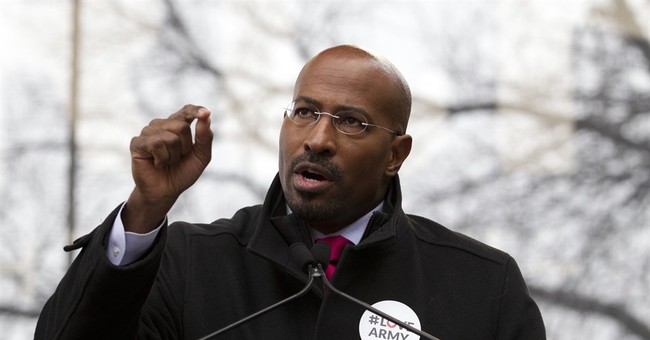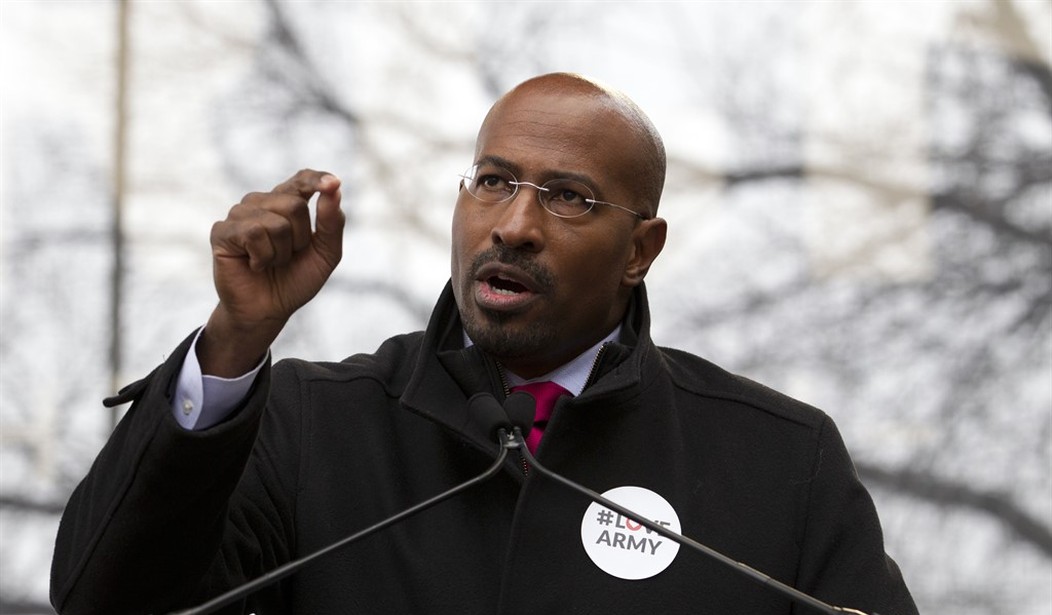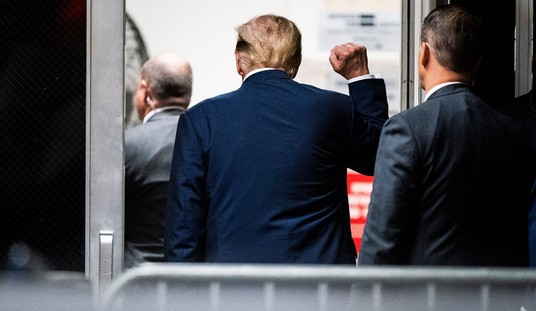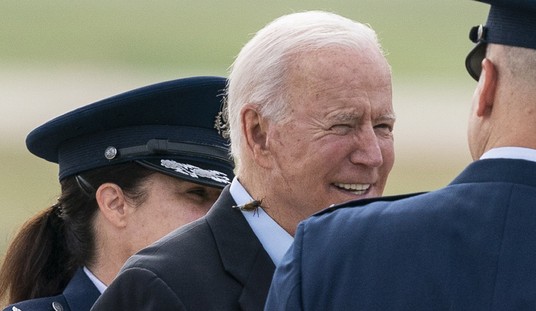
On Tuesday, political commentator Van Jones did something a bit different than most of his colleagues at CNN: He complimented something done by Donald Trump.
Speaking on the network while footage from the Rose Garden played, Van said the President’s executive order on American police reform is “a good thing.”
Van explained:
“Mainly because you saw the support of law enforcement there. That gives you a sense of where the bottom is — where the floor is — for reform, and that floor is higher than it has been.”
Mr. Jones praised the idea of a national database:
“There is movement in the direction of a database for bad cops. We’ve never had a federal database for bad cops. That’s why these cops go all over the place doing bad stuff.”
Here’s more:
“The idea that you’re gonna have de-escalators now alongside cops — you can talk people down and not shoot people down. The chokehold — that’s common ground now between Pelosi and Trump. So you see good stuff there.”
As reported by Fox News, the order “touches on the use of force best practices, information sharing to track officers who have repeated complaints against them and federal incentives for police departments to deploy non-police experts on issues like mental health, homelessness, and addiction.”
Additionally, it forbids chokeholds “except if an officer’s life is at risk.”
As for the aforementioned endorsement of law enforcement, the National Fraternal Order of Police — the country’s largest law enforcement union — had big words for the directive via a statement:
“It strikes a great balance between the vital need for public and officer safety, and the equally vital need for lasting, meaningful, and enforceable police reform. … In our view, President Trump and Congressional leaders are working constructively with law enforcement and community stakeholders to undertake earnest law enforcement reforms that will make our officers and the public they protect safer.”
Back to Van, he wasn’t all adulation. The Commander-in-Chief’s speech, evidently, left him less than enthused:
“It started off with a lot of unity, and then it moved off into politics, and a whole bunch of stuff that people are gonna fight about. And then it kind of tried to come back to unity at the end. All that stuff is classic Trump. It will be gone tomorrow.”
Yet, again, it raised the (low) bar:
“But what will be in place — there is a new floor, a higher floor, for Congress to now depart from that includes law enforcement support for data, for de-escalators, for better training. And — again — chokeholds. I think progress has been made, muddied by, I think, a speech that was…over the line in a lot of ways if you’re trying to go for unity. But I think the speech goes away over time. I think the progress that the people have made, in getting even the Trump White House, the Republicans, and now law enforcement along with Democrats to take steps forward is really powerful.”
That seems to suggest Trump and the GOP were less likely to champion reform than were Democrats. Is that correct?
Either way, a “good thing” is a good thing.
“[T]he speech, I don’t give it a high rating,” he reiterated, “but the executive order is a step in the right direction.”
Find the Safe Policing for Safe Communities order in its entirety below, courtesy of Fox News:
By the authority vested in me as President by the Constitution and the laws of the United States of America, it is hereby ordered as follows:
Section 1. Purpose. As Americans, we believe that all persons are created equal and endowed with the inalienable rights to life and liberty. A fundamental purpose of government is to secure these inalienable rights. Federal, State, local, tribal, and territorial law enforcement officers place their lives at risk every day to ensure that these rights are preserved.
Law enforcement officers provide the essential protection that all Americans require to raise their families and lead productive lives. The relationship between our fellow citizens and law enforcement officers is an important element in their ability to provide that protection. By working directly with their communities, law enforcement officers can help foster a safe environment where we all can prosper.
Unfortunately, there have been instances in which some officers have misused their authority, challenging the trust of the American people, with tragic consequences for individual victims, their communities, and our Nation. All Americans are entitled to live with the confidence that the law enforcement officers and agencies in their communities will live up to our Nation’s founding ideals and will protect the rights of all persons. Particularly in African-American communities, we must redouble our efforts as a Nation to swiftly address instances of misconduct.
The Constitution declares in its preamble that one of its primary purposes was to establish Justice. Generations of Americans have marched, fought, bled, and died to safeguard the promise of our founding document and protect our shared inalienable rights. Federal, State, local, tribal, and territorial leaders must act in furtherance of that legacy.
Sec. 2. Certification and Credentialing. (a) State and local law enforcement agencies must constantly assess and improve their practices and policies to ensure transparent, safe, and accountable delivery of law enforcement services to their communities. Independent credentialing bodies can accelerate these assessments, enhance citizen confidence in law enforcement practices, and allow for the identification and correction of internal deficiencies before those deficiencies result in injury to the public or to law enforcement officers.
(b) The Attorney General shall, as appropriate and consistent with applicable law, allocate Department of Justice discretionary grant funding only to those State and local law enforcement agencies that have sought or are in the process of seeking appropriate credentials from a reputable independent credentialing body certified by the Attorney General.
(c) The Attorney General shall certify independent credentialing bodies that meet standards to be set by the Attorney General. Reputable, independent credentialing bodies, eligible for certification by the Attorney General, should address certain topics in their reviews, such as policies and training regarding use–of-force and de-escalation techniques; performance management tools, such as early warning systems that help to identify officers who may require intervention; and best practices regarding community engagement. The Attorney General’s standards for certification shall require independent credentialing bodies to, at a minimum, confirm that:
(i) the State or local law enforcement agency’s use-of-force policies adhere to all applicable Federal, State, and local laws; and
(ii) the State or local law enforcement agency’s use-of-force policies prohibit the use of chokeholds — a physical maneuver that restricts an individual’s ability to breathe for the purposes of incapacitation — except in those situations where the use of deadly force is allowed by law.
(d) The Attorney General shall engage with existing and prospective independent credentialing bodies to encourage them to offer a cost-effective, targeted credentialing process regarding appropriate use-of-force policies that law enforcement agencies of all sizes in urban and rural jurisdictions may access.
Sec. 3. Information Sharing. (a) The Attorney General shall create a database to coordinate the sharing of information between and among Federal, State, local, tribal, and territorial law enforcement agencies concerning instances of excessive use of force related to law enforcement matters, accounting for applicable privacy and due process rights.
(b) The database described in subsection (a) of this section shall include a mechanism to track, as permissible, terminations or de-certifications of law enforcement officers, criminal convictions of law enforcement officers for on-duty conduct, and civil judgments against law enforcement officers for improper use of force. The database described in subsection (a) of this section shall account for instances where a law enforcement officer resigns or retires while under active investigation related to the use of force. The Attorney General shall take appropriate steps to ensure that the information in the database consists only of instances in which law enforcement officers were afforded fair process.
(c) The Attorney General shall regularly and periodically make available to the public aggregated and anonymized data from the database described in subsection (a) of this section, as consistent with applicable law.
(d) The Attorney General shall, as appropriate and consistent with applicable law, allocate Department of Justice discretionary grant funding only to those law enforcement agencies that submit the information described in subsection (b) of this section.
Sec. 4. Mental Health, Homelessness, and Addiction. (a) Since the mid-twentieth century, America has witnessed a reduction in targeted mental health treatment. Ineffective policies have left more individuals with mental health needs on our Nation’s streets, which has expanded the responsibilities of law enforcement officers. As a society, we must take steps to safely and humanely care for those who suffer from mental illness and substance abuse in a manner that addresses such individuals’ needs and the needs of their communities. It is the policy of the United States to promote the use of appropriate social services as the primary response to individuals who suffer from impaired mental health, homelessness, and addiction, recognizing that, because law enforcement officers often encounter such individuals suffering from these conditions in the course of their duties, all officers should be properly trained for such encounters.
(b) The Attorney General shall, in consultation with the Secretary of Health and Human Services as appropriate, identify and develop opportunities to train law enforcement officers with respect to encounters with individuals suffering from impaired mental health, homelessness, and addiction; to increase the capacity of social workers working directly with law enforcement agencies; and to provide guidance regarding the development and implementation of co-responder programs, which involve social workers or other mental health professionals working alongside law enforcement officers so that they arrive and address situations together. The Attorney General and the Secretary of Health and Human Services shall prioritize resources, as appropriate and consistent with applicable law, to support such opportunities.
(c) The Secretary of Health and Human Services shall survey community-support models addressing mental health, homelessness, and addiction. Within 90 days of the date of this order, the Secretary of Health and Human Services shall summarize the results of this survey in a report to the President, through the Assistant to the President for Domestic Policy and the Director of the Office of Management and Budget, which shall include specific recommendations regarding how appropriated funds can be reallocated to support widespread adoption of successful models and recommendations for additional funding, if needed.
(d) The Secretary of Health and Human Services shall, in coordination with the Attorney General and the Director of the Office of Management and Budget, prioritize resources, as appropriate and consistent with applicable law, to implement community-support models as recommended in the report described in subsection (c) of this section.
Sec. 5. Legislation and Grant Programs. (a) The Attorney General, in consultation with the Assistant to the President for Domestic Policy and the Director of the Office of Management and Budget, shall develop and propose new legislation to the Congress that could be enacted to enhance the tools and resources available to improve law enforcement practices and build community engagement.
(b) The legislation described in subsection (a) of this section shall include recommendations to enhance current grant programs to improve law enforcement practices and build community engagement, including through:
(i) assisting State and local law enforcement agencies with implementing the credentialing process described in section 2 of this order, the reporting described in section 3 of this order, and the co responder and community-support models described in section 4 of this order;
(ii) training and technical assistance required to
adopt and implement improved use–of-force policies and procedures, including scenario-driven de-escalation techniques;(iii) retention of high-performing law enforcement officers and recruitment of law enforcement officers who are likely to be high-performing;
(iv) confidential access to mental health services for law enforcement officers; and
(v) programs aimed at developing or improving relationships between law enforcement and the communities they serve, including through community outreach and listening sessions, and supporting non profit organizations that focus on improving stressed relationships between law enforcement officers and the communities they serve.
Sec. 6. General Provisions. (a) Nothing in this order shall be construed to impair or otherwise affect:
(i) the authority granted by law to an executive department or agency, or the head thereof; or
(ii) the functions of the Director of the Office of Management and Budget relating to budgetary, administrative, or legislative proposals.
(b) This order shall be implemented consistent with applicable law and subject to the availability of appropriations.
(c) This order is not intended to, and does not, create any right or benefit, substantive or procedural, enforceable at law or in equity by any party against the United States, its departments, agencies, or entities, its officers, employees, or agents, or any other person.
DONALD J. TRUMP
THE WHITE HOUSE,
June 16, 2020
-ALEX
See 3 more pieces from me:
CNN’s Van Jones Calls It Right Again: The Debate Stunk, and Trump is Set to Crush His Opponent
Tail of the Sea: Man Complains of Stomach Pain, Doctors Find a Large Fish in His Rectum
Sometimes They Fight Back: A Man Throwing Rocks at Cars in Chicago Gets Wrecked (VIDEO)
Find all my RedState work here.
And please follow Alex Parker on Twitter and Facebook.
Thank you for reading! Please sound off in the Comments section below.












Join the conversation as a VIP Member